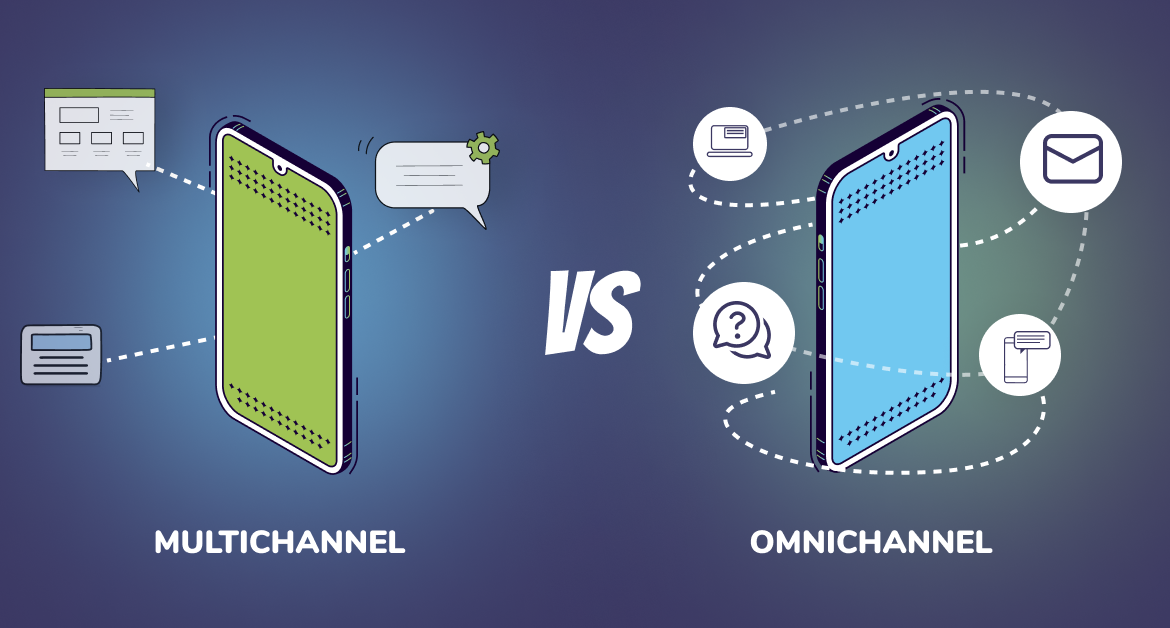
The term omnichannel simply means “all existing channels”. That is, to use all available ways to reach the specific marketing goal. Omnichannel marketing is a strategy implemented by actively and simultaneously using all channels that can be communicated with the target audience. All channels can be included in this method, which is generally referred to as “multi-channel marketing” in some cases. In other words, not only digital but also traditional channels are a part of this marketing method.
Omnichannel vs. Multichannel Marketing: 3 Examples and Strategies
In multi-channel marketing, there is a model that includes channels such as e-commerce sites, mobile application, social media, e-mail, as well as a physical store. In short, the business provides service wherever the customer can reach, which brings the customer experience to the perfect point. However, providing services in all of these channels cannot be called omnichannel marketing alone.
The difference between omnichannel and multichannel marketing
Omnichannel and multichannel are two methods that are mixed together. The difference between them is actually simple. In both strategies, customers are served through many different channels. In the multichannel method, each channel is managed independently from each other, while in the omnichannel method, all channels are integrated. In this way, the customer can perform each of the transactions related to a service he/she receives from a different channel, all channels know that customer, and the service and the stage of the service can be seen.
Multichannel marketing works for businesses looking to expand their e-commerce reach, but omnichannel marketing allows companies to fine-tune it. Omnichannel marketing requires more work and focus from your employees to implement. Many experts claim that the benefits are well worth the extra work and time. By applying an omnichannel strategy to your business, you can retain customers and continue to grow your business.
Omnichannel & Multichannel marketing examples
In the early stages of omnichannel marketing, it was sufficient to use two channels at the same time. However, it is always essential to develop new strategies to keep up with the pace of development of digital.
Imagine that you are a fashion brand serving both on an e-commerce site and in physical stores. Customers who come to the physical store encounter customer representatives waiting with tablets in their hands. They have the chance to examine all the details about the product they see in the store electronically. In addition, sales and invoicing transactions can be performed through these tablets. With this strategy, you add a new dimension to both e-commerce and omnichannel marketing.
Especially e-commerce sites and physical businesses with e-commerce sites are developing new strategies for multi-channel marketing by developing their own methods. One of the first examples of this strategy was seen in 2003. Best Buy has developed a multi-channel after-sales support method in order to compete with its strong competitors in the electronic environment. This method was to provide after-sales support to the customer both in-store and online.
One of the most successful examples belongs to the online clothing store Net-a-Porter, which once surpassed even the e-commerce giant Amazon. The company used mobile applications and social media to keep customers in the ecosystem. They used e-mail marketing to persuade customers to track store behavior, and remarketing ads to attract customers who left without purchasing. Using all these channels at the same time, the company achieved a significant growth with the income of these channels.
Omnichannel & Multichannel marketing strategies you can apply with Netmera
You can improve your omnichannel or multichannel marketing strategies by correctly evaluating the channels your business has. It is possible to implement these strategies even if you do not have traditional marketing channels. The main issue is to bring the customer experience to perfection by using all available channels efficiently. To do this, there are a few details you need to pay attention to.
1-Choosing the right channels
Choosing the right channels is one of the keys to providing the same user experience across all channels. You should not include a channel that you cannot be efficient in your omnichannel strategy. Netmera helps you to analyze customer data during channel selection. Once you select the right channels you can quickly start delivering your right content to the right customers at the right time with Netmera Orchestration Marketing Automation tool. For example, when the customer completes the order process via the mobile app, you can send an automatic email, SMS or push notification stating that the transaction has been completed successfully.
2-Make the most of customer data
One of the hallmarks of digital marketing is that it is measurable. You will also need these measured data in the omnichannel marketing process. At this point, you can collect and benefit from user data thanks to AI-based analytics tools Netmera offers for you. You can collect thousands of data and easily understand it through detailed yet simple-to-understand data reports. Netmera’s improved algorithms also help you create AI-based predictive segments to customize, arrange, and target your marketing content for specific audiences. Thus, you can know who you are addressing, get to know your customers, and determine what they are satisfied with.
3-Be active on every channel
Choosing the right channel is one thing, delivering quick and relevant content in those channels is another. Netmera allows you to synchronize all your communication channels to give your customers a seamless and complementary experience with your brand. You can start the communication with an email and continue through push notifications to keep the customer journey right on track. You can create automated messaging campaigns to prompt important user flows during each stage of the buying process. You can set up messages to trigger automatically based on user behaviors. Netmera helps you create multiple journeys for every stage of your customers’ lifecycle, from initial engagement and long-term engagement in line with your omnichannel marketing strategy.